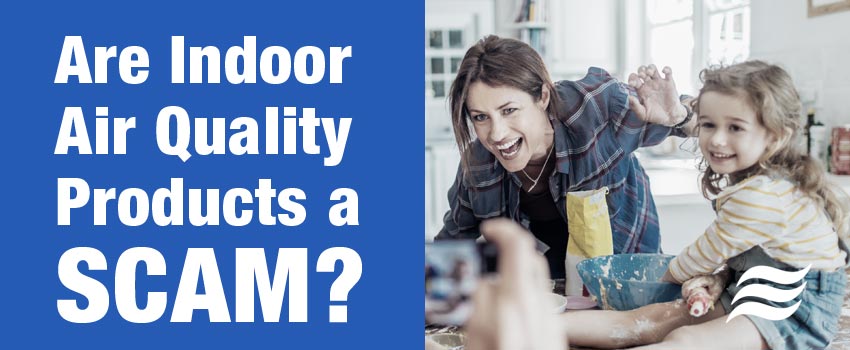
Are Indoor Air Quality Products a Scam?
Over the years, people have become more skeptical about why they need indoor air products and if they even work. Indoor Air Quality (IAQ) products are often seen as unnecessary, which isn't really true. Some people believe they're just scams. With the spread of COVID-19 changing how we live our daily lives, more IAQ products are on the market than ever before.
We understand it's easy to see some of the products out there as scams, but many of the products on the market are actually beneficial to your home.
The majority of IAQ products on the market can improve the air quality inside your house.
There are always some scams out there (if something sounds too good to be true, it is), but more often than not, a company will be selling an air quality product to help improve your family's health.
Good air quality is critical for people with asthma, allergies, and other breathing difficulties. Both humidity levels and airborne mold in your home can affect your health, so genuine IAQ products are so important.
The hard part is distinguishing between scams and authentic products.
Today we're going to take you through why indoor air quality is essential and how you can figure out what products are actually beneficial to your family's health.
Why Does Indoor Air Quality Matter?
People spend around 90% of their time inside, which is a lot of time.
If you think about it, your home is sealed up pretty tightly, which means not a lot of air in your home is fresh (unless, of course, you have a few windows and doors open every day).
So, most of the time, the air inside your home is full of:
- Dust particles
- Dead skin
- Bacteria
- Toxins
With a genuine air quality product, you'll be able to cleanse, purify and prevent any breathing issues from occurring.
Before we all tried to be more energy-efficient, homes could breathe. There were leaky windows, doors, and attics that gave the house some air. But now, it's common to have double or triple glazed windows as well as air-tight windows to minimize leaking.
Energy efficiency is brilliant. It helps you to save money on your energy bill, and it's fantastic for our planet. But, the more we seal up our house, the less air gets brought into our homes.
So, the only way to get past this is to introduce some high-quality indoor air quality products.
How Do You Know If You Have an Indoor Air Quality Problem?
Everybody thinks their house is clean, but every home experiences chemical emissions from cleaning products, dust and dander, humidity imbalances, toxins from outside, and many other particles trapped in your airflow.
Here are a few symptoms of poor indoor air quality:
- Cold or flu-like symptoms
- Dry, itchy throat
- Dry hair & dull complexion
- Chapped lips
- Coughing more than usual, especially at home
- A heavy, dirty feeling to the air
- Strange smells inside your home
How Can I Improve My Indoor Air Quality?
There are many ways you can improve your indoor air quality, including:
- Open up your windows more often
- Change your AC filters regularly
- Vacuum your rugs and carpets
- Buy some plants to keep your air fresh
Of course, you can also improve your indoor air quality with indoor air quality products, and we can help guide you through what products are suitable for your home.
We take indoor air quality very seriously and want to help you find a product that's suitable for your home.
How Can We Help Improve Your Indoor Air Quality?
Our team can help you improve your indoor air quality by providing you with indoor air quality product recommendations.
Here are five products we'd recommend you get for your home:
1. Dehumidifiers
A dehumidifier controls the level of humidity in your home. If you have too much moisture, it can be hard to breathe, especially for people with asthma or other breathing difficulties. It's also easier for mold and mildew to thrive in areas with high humidity.
2. Humidifiers
If the air in your home is too dry, then it can be uncomfortable to breathe, and it might make sleeping difficult. A humidifier will help make the atmosphere more humid and make the dry areas of your home easier to breathe in.
3. Air Cleaners
If you've got pets, then an air cleaner is definitely a must. It helps reduce allergens, including pet dander, dust, and other chemicals in the air.
4. Air Purifiers
An air purifier is similar to an air cleaner, except it can reduce the impact that pollen, dust, and smoke have on your breathing ability. It'll help you breathe easier and make you feel more comfortable.
5. Filters
Filters are so crucial to your HVAC system and need to be changed regularly, or they could impact the quality of air in your home. Some filters are better than others, and our team can help you choose the right filter for your home's HVAC system.
How Can Air Quality Products Stop the Spread of COVID-19?
There are two types of air quality products that have been proven to help slow down the spread of the coronavirus.
However, these products work best when paired with ongoing hand sanitization when you leave and enter your home and wearing a mask when in public. These products will not make you immune to the virus, but they can offer some protection.
These two air quality products are:
HEPA
HEPA or high-efficiency particulate arresting is a filter that's excellent at pulling things from the air. It takes particles that could damage your health and holds them, so they won't be recirculated around your home.
They're specifically designed to trap tiny particles and have been used to stop COVID-19 pathogens too.
The HEPA filter's range might not be 100% accurate, but it can take out a good bit of the virus if it's run continuously – somewhere around 99.94%.
UV Light Devices
UV light devices don't remove anything from the air but instead kill viruses, bacteria, and even mold spores by exposing them to UV light.
If COVID-19 is exposed to UV light in an air purifying device, then it could be disabled.
Both UV devices and HEPA filters are recommended if someone in your household has contracted COVID-19 or needs to quarantine to ensure they don't have it. By putting an air purifier in their room, you'll be able to protect yourself and others in your home from being exposed to the virus.
These products are also recommended if somebody in your home is high risk or has underlying health conditions that could be affected by the coronavirus.
The indoor air quality market is enormous and full of unique products that you might never have known existed. Sometimes these products can be a waste of time, and it can be hard to distinguish between the beneficial products and the scams.
The best thing to do in these situations is to talk to your local and trusted heating and cooling company – we happen to know a really good one.
This way, a trained professional can diagnose the air quality problem in your home and suggest a solution that fits your home's needs.
Not every house needs every type of indoor air quality product, but in our opinion, every home needs at least one!
Here at Nichols & Phipps, we want to make sure that you'll be able to breathe easily in your home with the right air quality product.
If you'd like to get your home assessed by one of our professionals, call us today at (703) 670-8519.
